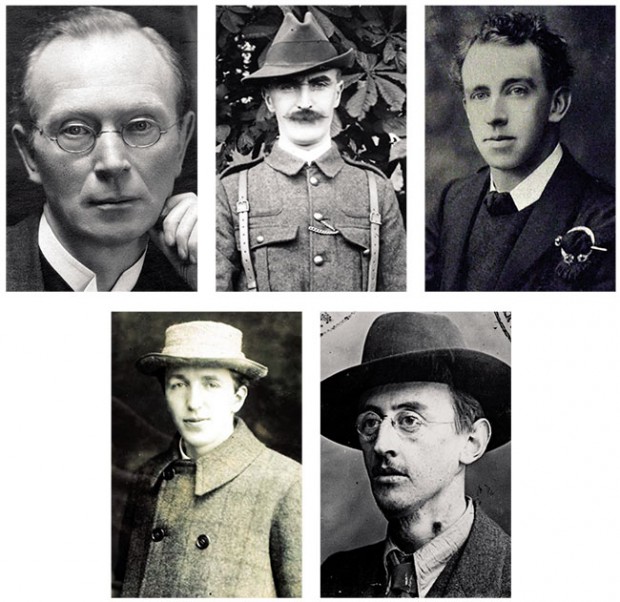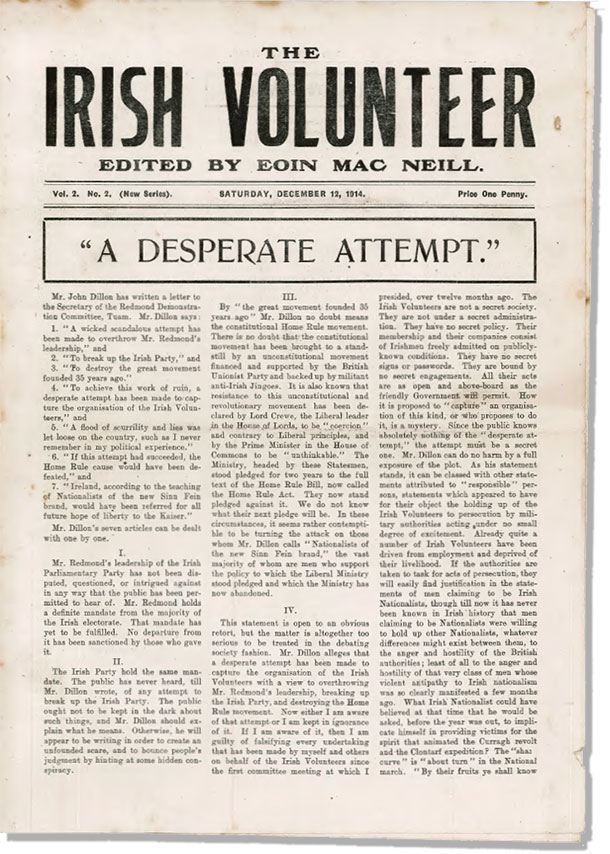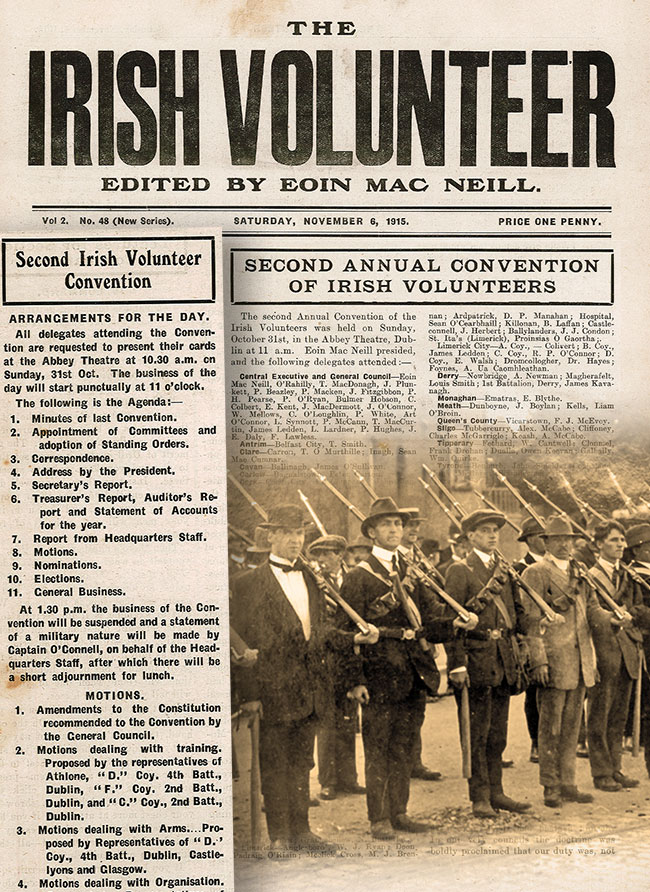31 October 2015
The 2nd Convention of the Irish Volunteers

• Irish Volunteers Headquarters Staff: Eoin MacNeill, The O'Rahilly, Thomas MacDonagh, Bulmer Hobson and Joseph Plunkett;
From The Irish Volunteer, 6th November, 1915
Report from The Irish Volunteer, 6th November, 1915 on the Second Convention of the Irish Volunteers, held in the Abbey Theatre on Sunday, 31st October 1915
AT THE Second Convention of the Irish Volunteers, held in the Abbey Theatre on Sunday, 31st October 1915, the Secretary, Bulmer Hobson, read out the following report:
The progress that we have to record after our year's work is that we have turned an organisation having in many places a nominal existence into an organisation that is in an active and vigorous condition, having over 200 corps actively training, and of which it can be truthfully said that any estimate of its strength based upon the reports received at Headquarters is an underestimate.
General Council
Immediately after the Convention last year the Executive took steps to hold an election in each of the counties in which there were three or more Volunteer Corps in order to carry out the scheme of county representation on the General Council of the Irish Volunteers. At the beginning of December, Wexford, Queen's County, Cork City, Kilkenny, Limerick County and City, Kildare, Kerry, Louth, Galway County, Dublin County and City, King's County, Tipperary, Belfast, Derry County, and the North of England and Scotland had each elected their representative on the Council, and the first meeting of the General Council was held at Headquarters on the 6th December. Since then little has been done to extend the system of county representation, and throughout the year the General Council has not had anything like its full strength. Ten meetings were held during the year. It will be possible in the coming year to have representatives from nearly every county in Ireland; and the making of the General Council more representative of the less well-organised districts will have a beneficial effect on the movement.
Headquarters Staff
One of the first things taken into consideration by the Central Executive after the Convention of last year was the thorough organisation of the Irish Volunteers as a military body. The first effective step towards this end was taken early in December, when the Executive decided to recommend the General Council to appoint a Headquarters Staff. The following compose the staff:
Chief of Staff– Eoin MacNeill;
Director of Arms – The O'Rahilly;
Director of Training – Thomas MacDonagh;
Director of Military Organisation Quartermaster – Bulmer Hobson;
Director of Military Operations – Joseph Plunkett;
At a much later date was added a Director of Communications, Eamonn Kent.
As a report is submitted from the Headquarters Staff it is not necessary for me to refer further to their work.
Organisers
In order to carry out the work of training the corps it was necessary to appoint a number of organising instructors, and in October, 1914, Captain Liam Mellows, who had been acting as Secretary to the Central Executive, took up duty as an organising instructor in the country. A month later Captain Monteith, who had been acting as Instructor in Dublin, was ordered to leave Dublin under the Defence of the Realm Act. The Central Executive thereupon appointed him organising instructor, and he took up duty immediately in Limerick City and County, where he did excellent work up to very recently. In January the Central Executive decided to appoint two more organisers. For the first six months of 1915 these four organisers were at work in different parts of the country, but in July Messrs Mellows and Blythe received orders to leave Ireland under the Defence of the Realm Act, and upon their declining to obey, were sent to prison for a term of three months. Mr A Newman, who had also been employed upon special work, received the same order, and underwent the same term of imprisonment. The Central Executive immediately upon their arrest appointed several new organisers to take up duty in their place.
A fortnight ago Mr Monaghan received an order under the Defence of the Realm Act to leave County Cavan, and having ignored the order, is at present in prison. Desmond Fitzgerald has also been arrested, and is in gaol under the Defence of the Realm Act. In addition, several Dublin Volunteers gave up their holidays to organising work last summer; while in several centres notably Cork City, the local Volunteers have done much to organise the surrounding country. It is hardly necessary, to speak of the excellent work done by our organisers in the country, but I am glad to have this opportunity of saying that their devotion, capacity and energy has been beyond all praise.
Recruiting
In addition to the work of the organisers, the Director of Recruiting organised several conferences when opportunity offered of getting any considerable number of Volunteers from different parts of Ireland together, with a view to spreading the organisation. At a later date County Conferences were arranged. Some of these have already been held, and it is expected that they will become in future a regular part of a system for recruiting existing corps and spreading the Irish Volunteer organisation where no corps exist.

The "Irish Volunteer''
Towards the end of November, 1914, the proprietors of the Irish Volunteer informed Mr. MacNeil of their intention to discontinue publication of the paper. It was decided that it should be taken over, and since 5th December, 1914, it has been edited and managed at Headquarters, and has been most valuable as a propagandist organ throughout the year. The Editor is particularly indebted for the unfailing supply of articles on military subjects which have been contributed by two officers J. J. O'Connell and Eimar O'Duffy attached to Headquarters.
In addition the office at Headquarters has constantly during the year supplied the provincial Press with articles, reports and items of news concerning the Irish Volunteer movement, and many of the provincial newspapers rendered good service by publishing all the matter supplied.
Camps
Early in the spring the question of organising training camps throughout the summer was considered by the Executive, and by the General Council; and the General Council decided to allocate the sum of £100 for the purpose.
It was found that there was much difficulty in procuring camping equipment from the regular manufacturers owing to the number of contracts placed by the English War Office. Apart from this, the type of tent most desirable for the Irish Volunteers, in view of our special necessities, would be more expensive than the English military tents, and it was necessary to effect economies. In consequence a special Volunteer tent was designed and their manufacture was undertaken at Headquarters. As a result all the tents needed for the training camps, in addition to a large number which have been sold to Irish Volunteers, were made at Headquarters. In use they have proved to be excellent, while their cost has been very considerably below the prices charged by the regular manufacturers. The first Summer Camp was held in the middle of July in County Tyrone. In August two camps were held, one in Wicklow and one in North County Cork, and in September one was held on the Shannon in County Galway. About two hundred men in all attended at these camps, and benefitted greatly from the course of training. It is to be hoped that next year similar camps will be organised in various parts of the country on a much larger scale and much more frequently than was found possible on the first occasion.
An Cumann Cosanta
The last Convention recommended to the Central Executive that a Defence Fund should be opened in order to assist Irish Volunteers who were prosecuted on account of their adherence to the movement. Very recently a Defence Fund was started which has been used solely to defray legal expenses in connection with the various trials.
Early in the year, however, the Central Executive and the General Council both had under consideration the position of men who were imprisoned or who lost their employment on account of their connection with the Irish Volunteers. It was felt that the best way to meet such cases was to establish a mutual insurance society and to offer to Irish Volunteers the opportunity of insuring themselves against loss of their means of livelihood on account of their connection with our movement. For this purpose An Cumann Cosanta was started, a large number of Volunteers have availed themselves of the facilities it offered, and are insured with it.
Since An Cumann Cosanta was started the Society has been able to meet all the claims that have become due without making any call upon Volunteer funds. It is to be hoped that during the coming year An Cumann Cosanta will be spread throughout the whole Volunteer movement, as it will introduce a financial solidarity that would enable the movement to come practically unaffected through any regime of coercion that may be instituted.
The Irish Volunteer Auxiliary
Recently the Central Executive decided to start an Irish Volunteer Auxiliary organisation to meet the wishes of many people who for various reasons were unable to join an Irish Volunteer Corps and take part in training. The members of the Auxiliary pay an annual subscription to the Irish Volunteers, and are expected to become armed and to learn to shoot. The extension of the Auxiliary throughout the country would add greatly to the strength of the movement.
The Treasurer [O'Rahilly] presented his report on the finances, together with the audited balance-sheet report and certificate of Messrs J. H. Reynolds and Co auditors. The Treasurer's report and balance-sheet were considered in detail by the Committee of the Convention, and their report to the general body expressed complete satisfaction with the financial state of the movement.
Reports were read from the Headquarters Staff, the Director of Military Organisation, Director of Recruiting, Director of Training, Quartermaster, Director of Communications, and Director of Arms. The following is a summary of their reports:

Headquarters Staff Report
Commandant Plunkett reported on the formation of the Headquarters Staff of seven members, each in control of a department, who would presently give their own individual reports.
The Director of Organisation [P. H. Pearse] reported that a special scheme of organisation had been drawn up to suit the particular needs of the Volunteers, which had been followed with success. Its object was to combine flexibility with cohesion. The organisation of the smaller units was almost complete; that of the larger units was progressing satisfactorily. To keep the work of organisation going visits of inspection were necessary, and the Director had personally visited the better organised districts, while the Headquarters Organisers had been working in all parts of the country, and this work was going on undeterred by the periodical imprisonments of individual organisers.
The appointment of officers and the maintenance of discipline were other branches of this department's work. Breaches of discipline were of extremely rare occurrence.
In the sub-department of recruiting the work divided itself into the strengthening of existing units, the formation of new units, and the enrolment of individuals and small groups. Recruiting literature, window cards, etc. had been circulated, and recruiting bodies established.
The Director of Training [T. MacDonagh] reported that a special scheme of training adapted to the needs of the Volunteers had been published, and where it was followed had proved a success. A drill-book had been written, and would soon be published. During the winter the Dublin Brigade had undergone special practice training, and in the summer Volunteers from all Ireland had received instruction in the camps.
The Director of Arms [The O'Rahilly] reported that in spite of all opposition, the Volunteers were steadily arming themselves. The main difficulty lay in awakening the companies to the imperative necessity of taking up at a reasonable price every arm that became available. Every Volunteer, he said, must be armed, and armed immediately.
The Quartermaster [B. Hobson] reported that a large number of tents had been manufactured at Headquarters, and had been found very successful at the camps. They were also available for sale to Volunteers. Military equipment had also been manufactured at Headquarters.
The Director of Communications [E. Kent] reported that numerous lines of communication between Dublin and the provinces had been established.
A number of amendments were introduced into the Constitution dealing with the number of members on Central Executive and similar matters. The declaration of Policy adopted by the last Convention was reaffirmed without alteration. It is as follows:
Declaration of Policy of Irish Volunteers
1. To maintain the right and duty of the Irish Nation hence forward to provide for its own defence by means of a permanent armed and trained Volunteer Force.
2. To unite the people of lreland on the basis of lrish nationality and a common national interest; to maintain the integrity of the nation and to resist with all our strength any measures tending to bring about or perpetuate disunion or the partition of our country.
3.To resist any attempt to force the men of Ireland into military service under any Government until a free National Government is empowered by the Irish people themselves to deal with it.
4. To secure the abolition of the system of governing Ireland through Dublin Castle and the British military power, and the establishment of a National Government in its place.
Motions dealing with the institution of a system of examination for officers, provision of arms, organisation, communications, and finance were dealt with.
Professor Eoin MacNeill was unanimously re-elected President of the Irish Volunteers, and the following were elected members of the Central Executive: O'Rahilly, Bulmer Hobson, P. H. Pearse, Sean MacDiarmada, E. Ceannt, J. Fitzgibbon, T. MacDonagh, Seumas O'Connor, J. J. O'Connell, Liam Mellows and Joseph Plunkett.
Follow us on Facebook
An Phoblacht on Twitter
Uncomfortable Conversations

An initiative for dialogue
for reconciliation
— — — — — — —
Contributions from key figures in the churches, academia and wider civic society as well as senior republican figures




